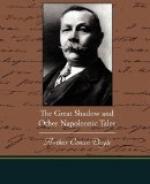“Hola, Jock!” he cried. “I didn’t thought to have seen you here, and yet I might have known it, too, when I saw friend Jim.”
“It is you that has brought all this trouble,” said I.
“Ta, ta, ta!” he cried, in his old impatient fashion. “It is all arranged for us. When I was in Spain I learned to believe in Fate. It is Fate which has sent you here this morning.”
“This man’s blood lies at your door,” said I, with my hand on poor Jim’s shoulder.
“And mine on his, so we have paid our debts.”
He flung open his mantle as he spoke, and I saw with horror that a great black lump of clotted blood was hanging out of his side.
“This is my thirteenth and last,” said he, with a smile. “They say that thirteen is an unlucky number. Could you spare me a drink from your flask?”
The Major had some brandy and water. De Lissac supped it up eagerly. His eyes brightened, and a little fleck of colour came back in each of his haggard cheeks.
“It was Jim did this,” said he. “I heard someone calling my name, and there he was with his gun against my tunic. Two of my men cut him down just as he fired. Well, well, Edie was worth it all! You will be in Paris in less than a month, Jock, and you will see her. You will find her at No. 11 of the Rue Miromesnil, which is near to the Madeleine. Break it very gently to her, Jock, for you cannot think how she loved me. Tell her that all I have are in the two black trunks, and that Antoine has the keys. You will not forget?”
“I will remember.”
“And madame, your mother? I trust that you have left her very well. And monsieur, too, your father? Bear them my distinguished regards!”
Even now as death closed in upon him, he gave the old bow and wave as he sent his greetings to my mother.
“Surely,” said I, “your wound may not be so serious as you think. I could bring the surgeon of our regiment to you.”
“My dear Jock, I have not been giving and taking wounds this fifteen years without knowing when one has come home. But it is as well, for I know that all is ended for my little man, and I had rather go with my Voltigeurs than remain to be an exile and a beggar. Besides, it is quite certain that the Allies would have shot me, so I have saved myself from that humiliation.”
“The Allies, sir,” said the Major, with some heat, “would be guilty of no such barbarous action.”
But de Lissac shook his head, with the same sad smile.
“You do not know, Major,” said he. “Do you suppose that I should have fled to Scotland and changed my name if I had not more to fear than my comrades who remained in Paris? I was anxious to live, for I was sure that my little man would come back. Now I had rather die, for he will never lead an army again. But I have done things that could not be forgiven. It was I that led the party which took and shot the Duc d’Enghien. It was I—Ah, mon Dieu! Edie, Edie, ma cherie!”




